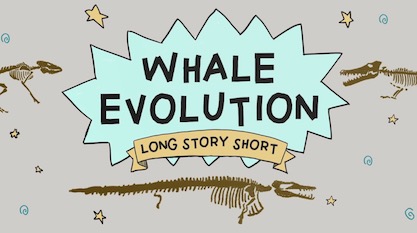 Evolution
Evolution
 Intelligent Design
Intelligent Design
Zoom Webinar with Wells, Sternberg on Whale Evolution; Join Us on April 23!

Darwinists often point to the whale fossil record as one of the best examples of an evolutionary transition. But is it?
Charles Darwin wrote in The Origin of Species: “I can see no difficulty in a race of bears being rendered, by natural selection, more and more aquatic in their structure and habits, with larger and larger mouths, till a creature was produced as monstrous as a whale.”
Bears turning into whales? Scientists today disagree, instead claiming that other land animals were the real precursors to today’s whales.
“Just think of all the parameters that would have to be modified,” says biologist and Center for Science & Culture Senior Fellow Richard Sternberg, “and then multiply that by, I don’t know — a thousandfold, or more than that. That’s the scale of the problem that you’re dealing with.”
Mark Your Calendar
Join us for the live, online premiere of the new video Whale of an Evolution Tale, the latest in the Long Story Short series of videos. Immediately following the video we’ll have a live Q&A about whale evolution with senior Discovery Institute biologists Jonathan Wells and Richard Sternberg.
Mark your calendar for Thursday, April 23, at 7 pm EST. Join us then online for a Zoom webinar. This event is easy to access, and free, but space is limited and registration is required. For more information and to register, go here!
“Long Story Short” is a new occasional video series that compresses key points in the debate between Darwinism and intelligent design into a very welcome format: concise, accessible, and quite amusing.
See our earlier “Long Story Short,” Is Homology Evidence for Evolution?, release here:
Jonathan Wells has received two PhDs, one in Molecular and Cell Biology from the University of California at Berkeley, and one in Religious Studies from Yale University. Richard Sternberg is an evolutionary biologist who also holds two PhD’s: one in Biology (Molecular Evolution) from Florida International University and another in Systems Science (Theoretical Biology) from Binghamton University.
